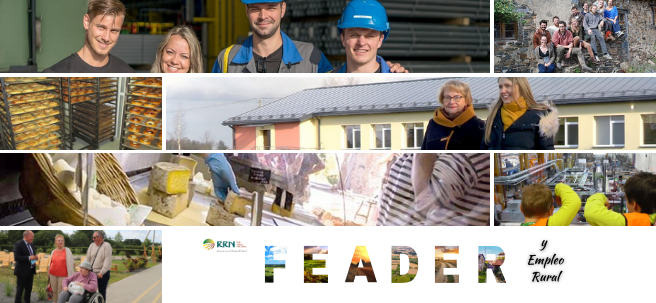
14 de December de 2020
December 14, 2020. Strengthening the socioeconomic fabric of rural areas is one of the general objectives of the Common Agricultural Policy (CAP). Thus, the EAFRD establishes three areas to guide the development of European rural areas: rural services, rural employment, and social inclusion.
- An organic farm in France, local bread in Slovakia, a network of local businesses in Austria, and social employment in rural Lithuania are some of the success stories of rural employment in Europe.
 |
During the current CAP period (2014-2020), the European Agricultural Fund for Rural Development (EAFRD) has achieved, through its Rural Development Programmes (RDPs), the smooth operation of its services in various rural areas across Europe, as well as business development and the transformation of these areas into inclusive and populated communities.
FEADER success stories in rural employment
Rural areas often provide a more attractive business environment due to lower costs and healthier lifestyles. However, there are tradeoffs, such as difficult connections to other communities, accessibility, a demographic deficit, and the development of certain services.
Rural Development Programs (RDPs) can contribute to a more attractive local business environment and thus promote rural employment, which is currently benefiting from the development of new technologies and emerging sectors such as green jobs and the bioeconomy.
What real-life cases of rural socio-labor development can we find in Europe thanks to the EAFRD?
An organic farm in France
In 2012, a group of ten young agronomists who had studied together decided to live in a rural community. In 2013, the group visited a collective farm in Mayenne, northwest France, specifically "La Tournerie." After securing funding from various sources, one of them from the French RDP, the group purchased "La Tournerie" and surrounding land from the owners, who were nearing retirement.
The collective farm began operations in 2015. Part of the land is dedicated to the organic market (gardening and greenhouses). Another part is dedicated to livestock : pigs, cows, and goats. Another part is dedicated to organic grains for the production of bread, beer, and pig feed. The farm produces seasonal fruits and vegetables, dairy products, bread, craft beer, and pork. Production was modest at first, but diversification consolidated the farm's profitability within two years.
The farm is now a model of business success. It opened a shop on its premises, as well as a café in the rural community, where members sell their own beer and regularly host concerts. In a sparsely populated region, the farm has brought a breath of fresh air to the surrounding villages.
Locally produced bread in Slovakia
Ján Bobro founded his bakery in Hriňová, Slovakia, in 1998. The bakery, which employed six people, produced several types of homemade bread and traditional pastries. It was so successful that he diversified his production, eventually employing up to 46 people at certain times of the year. In 2016, Ján Bobro decided to modernize and innovate his equipment and machinery , applying for the Slovak RDP.
Thanks to this investment, Bakery Hriňová now employs 59 full-time employees, with an additional six during peak periods. The bakery produces 2 tons of products per day and offers between 60 and 70 different products. Sales increased rapidly, and annual turnover rose from €1.8 million in 2017 to €2.3 million in 2019.
Network of local businesses in Austria
Murtal (Austria) is a rural district home to many local businesses from different sectors. In 2009, a private company used LEADER funding to establish a network of ten local companies called Kraft . The project formalized a network of local businesses, including individual entrepreneurs, SMEs, and other businesses. To date, more than 80 companies are active in the network, with a total of nearly 7,000 employees.
The project facilitates networking between companies in different economic sectors, ranging from crafts to services and research and development. One of the project's objectives is to motivate young people to stay in the region. This led to a business idea competition that has fostered creativity, entrepreneurship, and innovation, fostering the creation of new businesses and developing existing ones. Ultimately, by supporting regional business and cooperation, the network has created added value for the region.
Social employment in the Lithuanian countryside
Kaunas, Lithuania, is facing the emigration of young people, without whom problems such as elderly care and the closure of schools and other public services arise. Therefore, the community converted an old, now-closed school into a senior care home . The intervention of the local Local Action Group and the use of EAFRD funds were essential for the construction of the new home.
The new center offers 30 places for seniors and has created 18 full-time jobs for the local population.











